By Text and Photos by Angéles Mariscal
Videos by Chiapas Paralelo linked throughout.
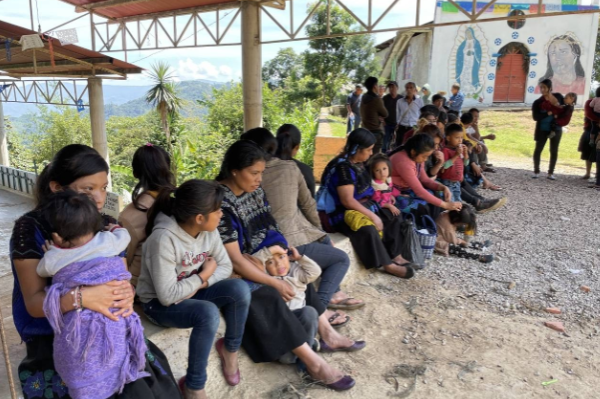
Thousands of indigenous people of Pantelhó and Chenahó displaced by the violence continue seeking asylum. In their communities, the actions of organized crime are increasingly visible. Indigenous people that call themselves the “self-defense groups of the people tried to expel the criminal groups. The Armed forces arrived in the region.
CHIAPAS — Thousands of members of the Mexican Army and the National Guard entered the municipality of Pantelhó, the place where last July 7th indigenous Tsotsil who refer to themselves as the “people’s self defense” tried to expel groups linked to illegal trafficking of goods and people, who took refuge in the City Hall. Residents and those of nearby communities in Pantelhó and Chenalhó abandoned their homes for fear of being attacked.
In the municipality of Pantelhó, the people don’t speak. Yésica and Gabriel are two of the few people that even remain in the municipal seat. The 7th of July of 2021, the group that call themselves “people’s self-defense” attempted to enter to remove the people they identify as members of organized crime, who for years have subjugated the population and murdered those who denounce them, among them the ex-president of Las Abejas de Acteal, Simón Pedro Pérez.
Both groups clashed for more than 30 hours. Until the 9th of July, military personnel removed the blockades that impeded the arrival to the place, and advanced to the presidential building of Pantelhó.
Yésica and Gabriel were locked in their house for three days, listening to bombs explode and shots from high caliber weapons, just a few blocks from where they live. They set out to the park upon seeing the military and reporters.
They managed to give an interview to this media outlet. But they only said that they don’t know what happened, they don’t know the reason for the clashes, that they don’t know what criminal groups there are in the area, and that they only want to live in peace.
A few meters from where they were giving the interview, a group of 20 hefty men, dressed in civil attire, some of them very young, observed them. Seeing that journalists were trying to speak with the people that remained in the area, they moved toward the place where Yésica and Gabriel were, whispered something to them, walked around the central park, and headed back again to the municipal presidency building.
Yésica y Gabriel then got up, and in low voices, asked us to erase the video of the interview, said that the group had threatened them, that they are being threatened, that they don’t want their faces to to appear, that they cannot talk about what is happening in the region, that the majority of the people left, but they preferred to wait because they don’t have family anywhere else, they explained before leaving.
This same group, who according to the residents, have threatened them, stationed themselves in the entry of the municipal presidency, where they handed the commander of the military detachment a document requesting the permanent presence of the armed forces.
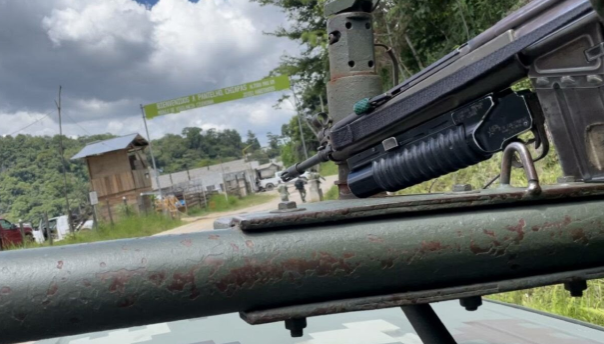
“Our patience ran out”
On the street that goes from the entrance of Pantelhó to the center of the town, the houses are empty, the businesses are closed. In one of the side streets there are hundreds of large caliber gun shells lying on the ground, traces of explosives detonated, stones strewn about, the windows of some houses are broken, and on their walls there are traces of gunshots.
Last July 7, a battle took place in this region. According to a video communiqué sent three days later by a group of indigenous people who call themselves “the people’s self-defense,” since 2002 the municipal authorities have opened the door to organized crime.
They report that only one of the leaders was arrested in 2019, but now a relative of his occupies the municipal presidency, and her husband is the mayor-elect.
The “people’s self-defense” claim that they are living under a “narco-government,” which has left them with a toll of stories of indigenous people murdered for refusing to participate in illicit businesses, or for denouncing them; the most recent case was the murder of Simón Pedro Pérez, which occurred on July 5. “We are witnesses to the murders they have made of our grandparents, parents and children,” they point out.
“So we decided to enter the town of Pantelhó on July 7, 2021 at 4 am, we did not enter to attack the people, but to expel the hired assassins, the drug traffickers, the organized crime,” whose members took refuge in the municipal seat, they explain.
They say that they carried out this intervention, “because our patience has run out, because we do not see any hope in the federal and state governments.”
In the video communiqué they explain that for now they have temporarily withdrawn from the area, but that they will not disband until the criminal groups leave their region. They also expressed their distrust of the armed forces, because they believe they are protecting their aggressors who, they insist, are in collusion with the three levels of government.
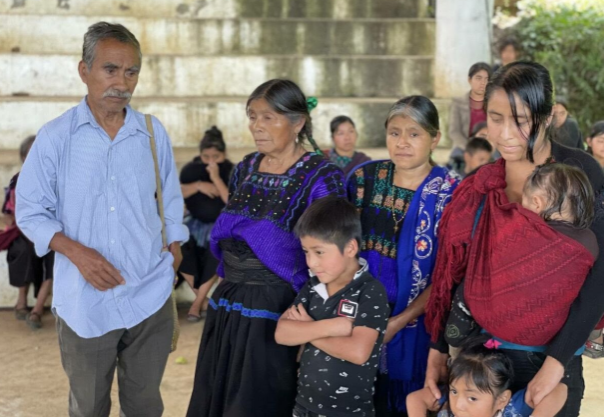
Abandoned towns
It is not only the municipal seat that remains semi-abandoned by the population. Inhabitants of nearby communities of Pantelhó and the neighboring municipality of Chenalhó also left the area.
The doors of the houses were suddenly closed, chickens and dogs were left outside, and clothes hung out on the patios. Those who were able left on July 6, but others have left in the days after, despite the fact that the armed forces removed the blockades that were in place to reach the area, settled in the municipal seat of Pantelhó, and did patrols of the region.
On one of these roads, located 10 minutes from the community of Acteal, thousands of large-caliber gun shells are also found on the ground — evidence of the confrontations that took place. These casings are from the shots fired by the military on July 8.
Rumors spread of the deaths of more than 20 people in these events, but none of the groups acknowledge having these casualties, neither the people they accuse of belonging to organized crime, nor the “people’s self-defense.” No one has seen people killed in the battles of recent days.
What can be seen on the roads are pickup trucks with indigenous people carrying the few belongings they managed to take out of their homes. Boys, girls, women and men are on board, they watch the road with fear, get out in a hurry and take refuge in churches, or in the towns where they believe they are relatively safe, and where doors have been opened to them.
“Don’t film, don’t film,” they beg us. They say they are afraid that their aggressors will recognize them in the videos that will be broadcast in the media. Only some, those who live farther away from the municipal capital of Pantelhó and the zone of influence where they find people who belong to criminal groups, agree to tell what happened.
Manuel Pérez Pérez and eight members of his family left the town of Quixtic in the municipality of Chenalhó on July 8 because “the bullets were passing over the roof of my house.
He says that the gunshots remind him of the Acteal massacre; he and his family are survivors of the 1997 massacre. “I have already lived through this violent situation, I live near the Pantelhó border and the bullets can be heard very close, we left because we are very afraid. I couldn’t take anything out, my chickens and turkeys were left behind,” says Manuel, an 83 year old man.
“For some time now they (armed groups) have been shooting, the situation has been getting worse and worse, then we started to be very afraid, because that is how it started in 1997. I feel that we are re-living what happened in 1997.
He, his family and some 200 other people found refuge in the community of Acteal, in the municipality of Chenalhó.
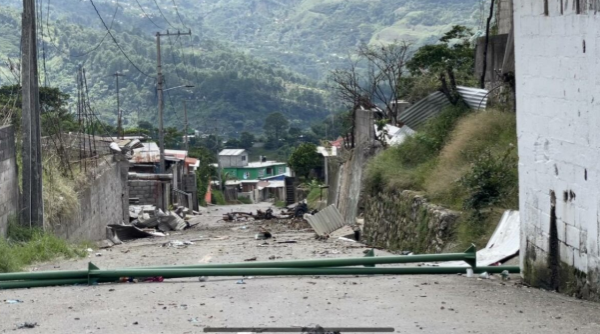
The journey to find refuge
Thousands of indigenous people from Pantelhó and Chenalhó who in recent days were displaced from their communities by the violence, continue to look for a place to seek refuge. Those who have relatives in the city of San Cristóbal de Las Casas settled with them; but hundreds more called civil society organizations to help them.
In an interview, they said that they are afraid to go to the shelter that the government of Chiapas set up on July 10. “They can identify us (the people they identify as members of criminal groups), they can see us because many are with the government, and we are afraid they will kill us,” they insist.
They are seeking food, a place to spend the night, “and that they stop these groups that have threatened us for years; but we know that there have been no arrests, so they are still free… we cannot return to our homes,” explains one of them, who with dozens of other indigenous people, received temporary shelter with a family who saw them lying down in one of the streets of San Cristóbal de Las Casas.
“What we are demanding is protection for all the people who have been displaced (…) they continue to leave the communities because there is a threat to their lives and their integrity, there is still no decisive action on the part of the authorities to stop the violence”, explained Jennifer Haza, director of the organization Melel Xojobal.
The communities of Majomut, Acteal, Yacteclum, among others, also received displaced indigenous people, but three days after their arrival, food is already scarce, and they are looking for an organization that can help them to get food.
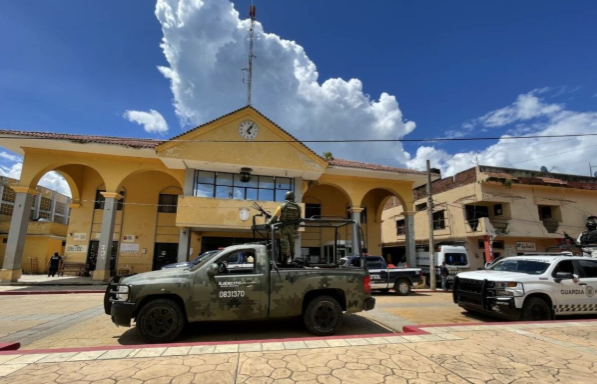
Self defense groups, a “desperate act”
Throughout the indigenous territories in the Altos of Chiapas — Aldama, Chalchihuitán, Chamula, Chenhaló, Pantelhó, among others, the activity of organized crime is increasingly more visible, Pedro Faro, director of Fray Bartolomé de las Casas Human Rights Center (Frayba) explains.
He refers to the fact that impunity is such that in Pantelhó the stolen cars are used by the municipal police, and the area has also become a human trafficking corridor.”There is marijuana planting and arms trafficking, there are many high-powered weapons for the exclusive use of the army, which makes us wonder who finances, who trains all these groups, who provides them with the park for all these shootings, to keep the region ravaged.”
Pedro Faro points out that the Mexican State has not acted to deactivate these groups, despite the denunciations made by the population.
In this context, the director of the humanitarian center believes that the formation of the “people’s self-defense” group is “a desperate action to get organized crime out of the place. We do not justify violence in any way, but in some moments, cases or situations, they leave the communities no other alternative but to exercise defensive actions,” as has already been seen in other states of the country.
However, he said: “I believe that it is time, now that the National Guard and the army have entered Pantelhó, it is time for them to carry out the legal investigation to locate the criminals, and to be able to dismantle this mafia network that has occupied the entire territory, who the communities have denounced directly with name and surname,” he said. This Sunday, authorities from 85 communities of Pantelhó sent a letter to the governor of Chiapas, Rutilio Escandón, in which they expressed their concern “about organized crime”; they demanded the removal of the current mayor, Dayli de los Santos Herrera, and the elected mayor, Raquel Trujillo Morales. They announced that they will elect new authorities through the usos y costumbres system.
This article was originally published in Chiapas Paralelo and re-published in Pie de Página on July 12, 2021. This English interpretation as a merger of both has been republished by Schools for Chiapas.
